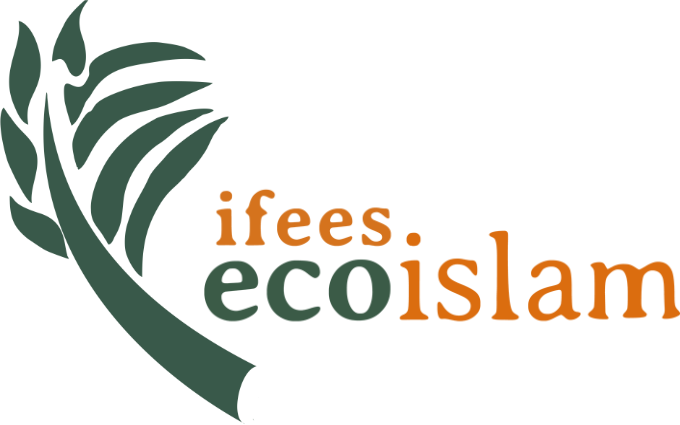At IFEES we have set ourselves the task of developing environmental themes based on Islamic teachings
As this work evolved it became apparent to us that there was a huge knowledge gap and new techniques were needed to quickly raise awareness amongst Muslim populations world-wide on what these teachings had to offer.
This was an urgent necessity. A crash programme of teaching Islamic environmental ethics was essential and for this to happen the material first had to be researched, then put together in a recognisable form and finally delivered in a way that the substance, meaning and relevance of the teachings could be quickly digested. This process began in the early 1990’s and by 1995 we were designing a package of photographic slides (the technology of the day and now power point presentations and who knows what next) which eventually became known as Qur’an, Creation and Conservation and published by us in 1999. In a discussion we had with Dr. Abdullah Umar Nasif, the former Secretary General of the Muslim World League (Rabita al Alami) in Jeddah, Saudi Arabia in 1998, we concluded that what we were putting together was a fresh approach towards teaching environmental ethics drawn from the Qur’an and that it would be appropriate to call this Ilm ul Khalq (Knowledge of Creation).
It is not often that verses from the Qur’an are taught from power point presentations coupled with active contributions from workshop participants. We piloted these techniques with junior schools in the UK to undergraduates in Malaysia with quite encouraging results. The real test came in 1999 when we were invited by a CARE International an American based NGO, to deliver a workshop based on our methods to fishing communities in Zanzibar, who were dynamiting coral reefs to catch their fish. It would appear that mainstream NGO’s were having little success in stopping dynamiting in spite of years of hard work. The workshop we conducted in Wete Wete in Pemba (the Northern of the two islands that make up Zanzibar) resulted in the almost immediate voluntary stoppage of the practice of dynamiting by the fisherman, and we knew then that we had developed an effective method of communicating environmental messages based on Islam to a wide range of participants. In addition to the leaders of the fishing community, there were representatives at the workshop from the office of the local mufti, imams from the local mosques, local and central government officials and local and international NGO’s.
The following is a sample of the Islamic Environmental Ethics workshops we have conducted world-wide since our successful pilot in Zanzibar in 1999 –
- 2013 – Ulema and project workers, Dar as Salaam. Farm Islam supported by Islamic Help, Birmingham, UK.
- 2013 – Muslim College, Cambridge, UK.
- 2012 – Muslim College, Cambridge, UK.
- 2011 – Ulema in Kano, Northern, Nigeria. Supported by the British Council
Ulema Council
- 2011 – Trainee teachers, Surabaya, Indonesia. Joint programme with the British Council, the Royal Geographical Society and the Royal Meteorological Society.
- 2010 – Ulema, Padang, West Sumatra. Darwin Initiative, Durrell Institute of Conservation and Ecology, Kent University, UK.
- 2008 – Under grads. & environmental activists – IFEES initiative. Birkbeck College, London.
- 2007 – Under grads. & environmental activists, School of Oriental and African Studies (SOAS). IFEES initiative.
- 2007 – UK environmental activists, Utruj Foundation, London.
- 2007 – Hounslow Asian and African Youth Association. Hounslow mosque, London. Supported by local government.
- 2006 – Communities leaders and local officials living around the Batang Gadis National Park, North Sumatra. Supported by Muslim Hands, Nottingham, UK.
- 2006 – Islamic scholars in post-tsunami Bander Aceh. Supported by Muslim Hands, Nottingham, UK.
Ulema Aceh, Indonesia
- 2005 – Under grads and environmental activists Swansea, Wales. Supported by Wales Environmental Link Creating Opportunities for Muslim Engagement (WELCOME).
- 2002 – Ulema, conservationists, community leaders. Kerinci Sebalat National Park, west-central Sumatra. Supported by the World Bank and the Alliance of Religion and Conservation.
- 2002 – Luhur al Wasilah pesantran (religious boarding school), Garut, West Java. Supported by the World Bank and the Alliance of Religion and Conservation
- 2000 – Community leaders and environmental activists, Spiney Forest, Madagascar. Supported by WWF International.
- 2001 – Ulema, fishing community representatives, Local government officials. Pemba, Zanzibar. Supported by McArthur Foundation, USA, CARE International, USA.
- 1999 – Ulema, fishing community representatives, Local government officials. Pemba, Zanzibar. Supported by the Ministry of Agriculture, Natural Resources and Environment, Zanzibar, CARE International (USA), World Wide fund for Nature International (WWF) and the Alliance of Religions & Conservation (UK)
The second IFEES initiative was a Colloquium on Islamic Fiqh on the Environment which we set up in 2007. This event was also supported by Muslims Hands backed by the Jakarta based State Islamic University (Universitas Islam Negeri Syarif Hidayatullah), Indonesia’s Ministry of Environment and Conservation International. Leading Indonesian scholars and their international counterparts were brought together to explore the basis of Islamic environmental law.
And He has subjected to you, as from Him, all that is in the heavens and on earth: behold in that are Signs indeed for those who reflect
Qur’an, The Crouching (Al-Jathiyah) 45:13
